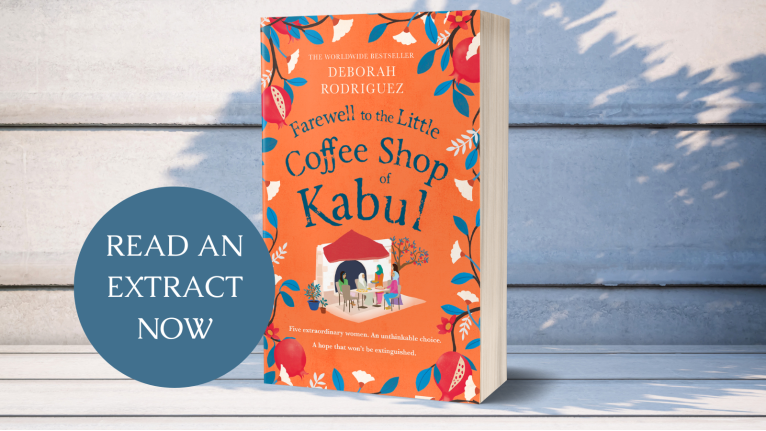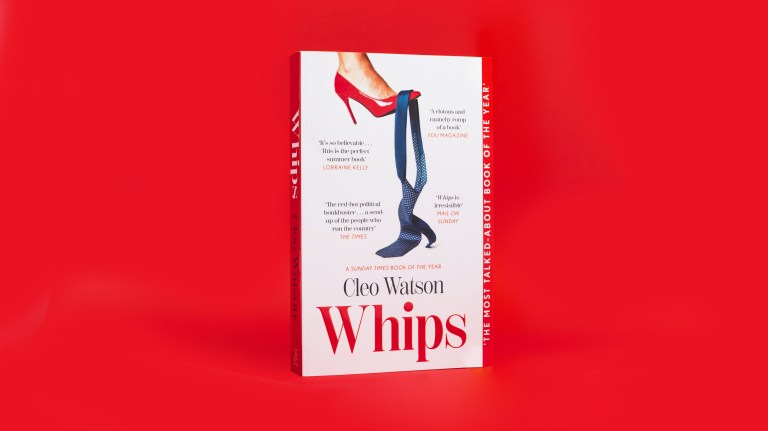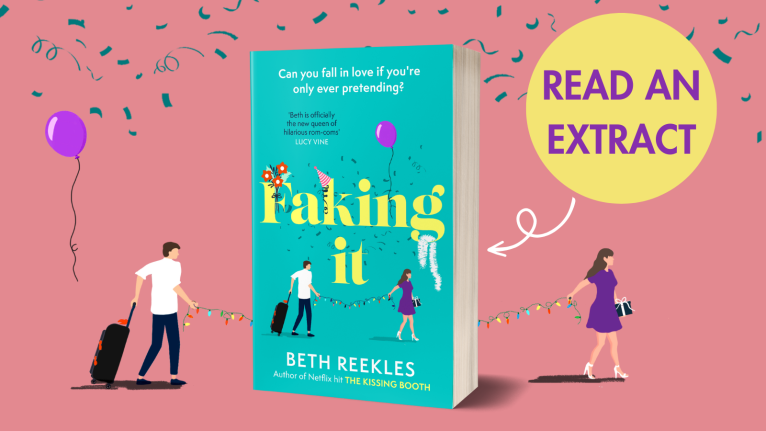Read an extract from Jenny Colgan’s Sunrise By the Sea!

Chapter One
The sun had been out earlier that day, and the family had all gone out to play.
If you were to glance at the family, you probably wouldn’t notice anything strange at first.
It would probably make you smile to realise that the children were twins, and that they each took after a parent so convincingly – the boy his father’s double, with a shock of unruly blond hair and a wide smiling face; the little girl more cautious- looking, with freckles and her mother’s strawberry- blonde hair and pale skin.
Look closer and you would also see something flapping around them, and assume there was something wrong with your vision, because what on earth was a puffin doing there?
Avery and Daisy had come tumbling down the lighthouse stairs in their usual noisy way.
For the first year or two of their lives, the stairgate had never been opened and had basically confined the children to the barracks of the sunny ground- floor kitchen, because Polly Miller, née Waterford, was terrified of them tumbling down the lighthouse’s circular staircases and cracking their heads open. It was an even stupider idea to live in a lighthouse than it had been before the children, love it as they may.
But her hopes of keeping them safe were completely thwarted when, around eighteenth months or so, she looked away for two seconds then turned back to see Avery holding up the bolt while Daisy turned it, and Neil (the puffin) standing on the gate, almost as if it was his idea. He certainly fluttered up the stairs guiltily as soon as Polly caught them. The days of the stairgate were numbered. She remembered it as if it were yesterday.
‘Now,’ she had said patiently, as she had a million times before, pulling them on to her lap on the squishy threadbare sofa, the blond head so like Huckle’s; Daisy so like her, ‘we don’t go upstairs.’
‘Ustairs,’ repeated Avery. Daisy nodded. ‘Ustairs . . . NO?’
Huckle had come in for lunch then, and grinned, as the twinsscrambled down and hurtled across the flagstone floor shouting
‘DADA!’
‘Are you teaching them that going upstairs is the most exciting thing in the world again?’
‘They opened the stairgate. Working as a team.’ Huckle hoisted the two little people up, one arm each.
‘Oh, you are brilliant,’ he said, as they giggled, and he nuzzled them both.
‘It is not brilliant,’ said Polly. ‘They start scrambling up there and someone is going to fall and kill themselves.’
‘I thought that’s why we had two,’ said Huckle, heading towards the stove.
Now, four years on, they had indeed both tumbled down several times, seemingly without injury, and retained the same basic gang set- up – boy, girl, puffin – that took getting into mischief to new levels all the time.
‘I always thought Neil would have been jealous of the babies,’ Polly was saying now, as they watched the three of them trying to play swingball – Neil hovering, then flying up when the ball came round – while she and Huckle sat out in preciously warm spring sunshine.
The lawn streamed down towards the rocks, and normally it was too windy to sit out there, but there was a spot, just behind a low wall, where the wind was blocked and you could lie down and feel the sun on your face and just for a moment everything would be warm and lovely.
Unfortunately it also blocked Polly’s views of the twins, so it necessitated bobbing up and down every couple of minutes like a meerkat, and steeling yourself against the wind.
‘Neil was unbelievably jealous of the babies!’ said Huckle, astonished she’d forgotten. ‘You were in a milk coma. A nuclear bomb could have gone off and you wouldn’t have noticed unless a piece
of dust had gotten on the babies. What do you think all those marks are on the cradles?’
‘I thought they were just features.’
‘Peck marks!’
‘Oh goodness. Bad bird.’
‘He’s a terrible bird,’ said Huckle with equanimity. ‘Almost like you shouldn’t keep wild sea birds in captivity in the first place.’
‘You shouldn’t,’ agreed Polly. ‘He keeps me.’
When Polly had first moved to Mount Polbearne, alone and nervous years ago, following the collapse of her business and engagement, in short order, a baby puffling had crashed into the bakery one night. After nursing his broken wing back to health, she had tried to release him back into the wild, but he hadn’t taken.
Neil had decided that living with a baker was infinitely preferable to diving into the cold sea every day to find fish, and Huckle was inclined to agree with him.
They both watched Neil sweep around the children.
‘I mean, he could—’ Huckle started.
‘Neil can’t babysit!’ said Polly sternly.
‘I know, I know,’ said Huckle. ‘I just thought it might be a nice night to sit out at Andy’s’ – Andy ran the local pub and a superb chippy – ‘or even go up to the posh place and have a glass of wine. Without some small monsters wriggling all over it.’
‘We could call Kerensa,’ suggested Polly, meaning Reuben’s wife, their rich friends who lived on the mainland.
‘I’m not in a Reuben- handling mood,’ said Huckle. ‘Plus . . . Lowin.’ Even though the twins were miles off, they bounced over.
‘ARE WE GOING TO LOWIN’S?’
Lowin, Reuben and Kerensa’s son, who was now almost eight years old, was the hero of the twins’ lives, living as he did in a huge Tony Stark mansion with every computer game and every piece of Playmobil ever made. Lowin, for his part, tolerated the children more or less, as long as they did everything he said in every game and obeyed his every whim, just like the paid staff did. Daisy and Avery were his very willing slaves and were quite happy to go along with whatever Lowin’s newest phase was.
Normally it was fine when it was an Avengers obsession phase, or a racing cars obsession phase. But Lowin’s latest obsessive phase was snakes, and despite Kerensa’s promises, Polly was never 100 per cent certain Reuben wasn’t about to buy him a huge boa constrictor and just let him wear it everywhere like a scarf until it ate Neil.
‘Not today.’
The twins’ faces looked downcast.
‘But he’s getting a huge slide shaped like a snake! The biggest ever!’
‘That sounds dangerous,’ said Polly, getting up. ‘Okay. It’s just leftover chicken.’
‘That’s all right,’ said Huckle, who was about to hit the road again, repping his honey business. Times had been tough – there had been floods all over the West Country and a lot of business were finding it difficult to keep going but he was doing his best.
‘It’s good to have home- cooked food. It’s going to be nothing but restaurants and hotel food for a fortnight.’
‘Say that like you’re sad about it,’ pleaded Polly.
‘I am!’ said Huckle. And then, more seriously, grabbing her hand.
‘You know I am.’
‘I wish I was going off to stay in hotels.’
‘It’s not the Ritz! It’s a Travelodge off the A40!’
‘I know. But anywhere is the Ritz with you.’
They shared a kiss. He hated going away. But he had to. They had enough trouble keeping their heads above water as it was.
‘Think of the windows,’ he said.
‘I know, I know.’
If they could replace the lighthouse’s ancient rattly single- paned glass with English Heritage- approved double glazing, the difference it would make in the quality of both of their lives would be immeasurable. No more icy plunges down the circular staircase; no more painful hauling themselves out of bed.
Although, who knew? The house might never be warm to other people’s standards – Polly’s mother’s, for example, or Kerensa’s, or, well, anyone’s, really. But to the four of them – the children had never known anything else – it was just perfect. Huckle had put an old TV in the master bedroom, and through the cosy nights of winter all four of them curled up with the electric blanket on, Neil hopping on the nightstand, watching Moana, and it was, windows or not, as happy a place as Polly could possibly imagine.
And now spring was coming! And if Huckle made enough this year they were going to get windows and a new boiler, so there was very little to complain about, thought Polly, as she headed back into the kitchen, listening to the merry voices of the twins demanding that their father became a tiger MEEJETLY which he obligingly did, growling so fiercely that Polly wondered if Avery would get upset. Daisy would dry his tears if he did.
She added barley and vegetables to the chicken stock she had boiled up from the roast, happily looking forward to when Huckle would be home for the summer, and the tourists would start to arrive for the season and they would be cheerfully flat out. She couldn’t wait to feel the sun warm on her face again, not the endless winter storms that had seemed to arrive every single weekend.
For months the rain had thrown itself against the windows and the house was full of wet wellingtons and the children got cranky when she couldn’t get them out enough, the pleasure of building dens indoors and helping Mama bake having grown stale. The storms had been getting worse – climate change, she knew – and the winters were getting harder.
‘What’s up when I’m away?’ Huckle asked now, following her in while simultaneously half- listening to Avery talk about how Lowin was getting the biggest snake in the world for his birthday.
‘Usual,’ said Polly. ‘Oh no, I forgot! Reuben’s waifs and strays are arriving!’
Chapter Two
At that moment, over in Exeter on the mainland, one of Reuben’s waifs and strays had no idea that was what she was about to become.
Caius – ‘pronounced “keys”’, as he liked to tell people snottily when they attempted it for the first time, unless they by some chance got it right, in which case he would say, ‘It’s “ky- us”, actually?’ – was banging heavily on his flatmate’s bedroom door, but to no avail.
‘Marisa!’
It was, fair enough, hard to hear over the racket. Caius theoretically liked having lots of friends who were DJs, or said they were, but then he made the mistake of asking them to come and play at his parties and it was horrendous and they all squabbled with each other over how expensive their headphones were, and mixed up their stupid boxes and vied to play very obscure stuff, and frankly, it was a racket.
If he’d cared about his neighbours he would have factored that in too, but, being rich and good- looking, Caius so rarely met people that didn’t like him that he often found it hard to imagine what that might be like.
The flat was absolutely heaving, mostly with people he knew, kind of, some he didn’t, but they were good- looking and appeared well- off, so that was fine too.
But he needed the little room his parents had insisted he let out – something to do with ‘learning how to take responsibility’ or ‘managing efficiently’; it had been hard to tell, he had been on the worst comedown while they’d been talking to him and he still had his earpods in so it could have been anything.
‘Marisa,’ he yelled again, as loud as he could. He winced. Caius didn’t really like shouting; he liked drawling or, even better, not saying anything at all and merely waving a hand at waiters bringing him things.
‘Marisa! Come on, it’s a party! Can’t you make us some canapés?’
Still no reply. He pouted. She must have heard him by now.
Marisa used to be fun. Well, not fun, exactly, she had a real job and went to bed at a reasonable hour. But she cooked and smiled and was funny and he quite liked someone kind of looking after him.
Then she’d gone all quiet and sort of vanished and he knew she’d told him why, some family shiz, but he kept forgetting, and it was really terribly tiresome.
‘Marisa! People want to use this room! For coats!’
‘And also sex and taking drugs,’ said one of a trio of people in black eyeliner appearing behind him, the other two vigorously agreeing.
‘No! Totally none of those things, just probably coats!’ said Caius. He frowned. ‘You know there’s tequila out here, right? There’s tequila out here and none in where you are, which means I don’t understand you at all.’
Well, they agreed about one thing, thought Marisa. Because she
didn’t understand herself either.
Chapter Three
Inside her little box room – like many of these expensive new builds in Exeter, the main room was flashy and showy with a big glass wall and a balcony, but the smaller bedrooms were done on the cheap – Marisa Rossi sat on the end of her bed, knees up to her chin, headphones on, the clatter beyond the door more or less white noise.
Another party. Another night when the rest of the world was out and about, having fun. Everyone else seemed fine. Everyone else always seemed fine. And, in the scheme of things, losing a grandparent was hardly heartbreaking loss. A lot of people lose grandparents. Everyone, when you think about it.
And they all still seemed able to go to parties. Everyone but her.
But somehow, she could only think of her nonno, Carlo: her kind, funny grandfather in Imperia, Italy, descended from generations of shipbuilders – a tradition that had only stopped with her mother, Lucia, who had left for the UK to find a better life, and married a man from Livorno, just down the road. Marisa’s father couldn’t bear the cold and the rain and left England- and Lucia alone, with Marisa and her brother, Gino. Marisa tried not to take it personally.
But her grandfather had stepped into the breach, and then some. Her fondest memories were golden: holidays spent in Italy; long days on the hot windy shores of Imperia, as the great big industrial ships rolled past; late dreamy evenings at restaurants as she ate spaghetti vongole and fell asleep under the table as the adults talked and laughed long into the night; cool hands rubbing in cream to sunburned shoulders; ice creams as big as a beach ball; stones underfoot as you ran into the water; the pungent scent of the exhausts of the Vespas of the young men gunning around the town, a contrast with the smartly uniformed navale stationed there; the long rolling rhythms of Italian summers.
Abandoned in her teens for holidays with her British friends on cheap packages in the Balearics, drinking shots and laughing uproariously, they sometimes, in her memory, felt like a dream; snatches of an older language tugging somewhere at the fraying edges of her brain, another person, happy and free, in big fussy- bowed dresses her grandmother – who was as stiff as her grandfather was loving – liked to buy her, and which she adored and her mother thought were absolutely awful.
Then life interfered, took her to college and on to Exeter and a job she used to love – being a registrar for the council. Births, marriages and deaths, it required a combination of a love for and interest in people, with a fairly meticulous approach to record- keeping, and nice handwriting. Marisa was not a show- offy type of person at all,
but she was incredibly proud of her handwriting.
Then Carlo had died.
‘There’s no rhyme nor reason,’ her nice but very harassed GP had told her, when she explained the insomnia, the constant crying and, increasingly difficult for work, her encroaching fear of leaving the house and speaking to people, that seemed to get worse every day. ‘Grief affects everyone differently. It seems to me you have an anxiety disorder, shading into agoraphobia. I would suggest the best course is antidepressants.’
‘My grandfather died!’ Marisa had said. ‘I’m sad! I’m not “depressed”! This is normal.’
‘I’m just saying that they would almost certainly help.’
‘But then . . . ’
Marisa fell silent.
‘What if I don’t even miss him any more? What if I don’t feel anything?’
The GP, too, fell silent, wanting to be reassuring; unable to mislead.
‘The wait for counselling is very long,’ she said, finally.
‘Put me on it,’ said Marisa. ‘Please. Please.’
‘Okay,’ said the GP.
‘Why?’ said Marisa. ‘Why am I the only person who can’t get on with their life?’
The nice GP shook her head sadly.
‘It only looks that way,’ she said. ‘Don’t be fooled for a moment.’
She hadn’t been able to make it in time. He’d been out pruning in the garden, in the big black hat he wore all the time, probably, and had collapsed. No time to call, no time to say goodbye to the most important man in her life.
People saying he wouldn’t have known a thing about it, that it was better that way, did not, in Marisa’s opinion, know what the hell they were talking about. Did they seriously think he wouldn’t have wanted to say goodbye to the family he loved so much: her mother Lucia, her sister Ann Angela (actually Anna Angelica but quite the mouthful by anyone’s standards), the boys, and . . . well, her?
Somehow, she found the funeral, which she had to dash to, even more difficult. Her nonna, or grandmother, garbed in black, was cross and busy in the kitchen, insisting on cooking for thousands and refusing, in Marisa’s eyes, to face up to what was happening at all. And there was so many people – cousins, family, friends, bloody butcher and baker and candlestick maker – talking about how much they’d loved him (and, by inference, how much he had loved them in return), that the entire noisy family felt overwhelming on that wet October Italian day, and there was so much shouting and noise and Marisa, who had always been quiet, had retreated further into her shell, worrying that, after all, the love she had felt from her grandfather had meant little, amid the clamour. He had been quiet too. She yearned for his big hand in her smaller one; couldn’t believe that she would never feel it again. But everyone else’s grief had felt louder, more pressing. And so she had taken hers home, let it sit, forming inside her, more and more layers building up, cementing it in place, holding her down like a ball and chain, and as the months had passed she’d found it increasingly difficult to leave the house at all.
‘Do you think you need your aura cleansed?’ Caius had said, and she had given him a look, but Caius was one of those people who could never notice when he was being annoying, and probably wouldn’t believe you if you’d told him. He’d been sent from the US to do a very expensive course in something or other near some uncle, but Marisa hadn’t seen him go once.
‘You just need to come out and get pissed up, durr, obviously,’ said her best friend Olive, but she somehow couldn’t face doing that either.
She pretended she had evenings out planned with work colleagues, which was a complete lie, but the other lie would be to pretend she had a date, which she didn’t, or she could be honest and say she was occasionally seeing Mahmoud again, but they all hated his guts for being a lazy cadging loser (albeit a very, very handsome, fit, lazy cadging loser) so she didn’t want to say that either. Aged twenty- nine, Marisa’s romantic history was . . . not patchy exactly. But being an introvert meant that often she hadn’t quite managed to pluck up the courage to tell people she didn’t like them that much, and things could bumble along, or she would lack the courage to make it clear to people she did like that she liked them, and they’d pass her by. When Olive had fancied Keegan, for example, she’d stuck on her false eyelashes and her push- up bra and simply turned up everywhere he was. And now they had bought a flat together and were planning on a baby and Marisa was delighted for them, of course she was, but the world was easier, she felt, on the confident Olives than on the shyer girls. Also, Olive pointed out that Mahmoud treated her like a doormat and the fact that that was completely true didn’t make her feel any better.
Anyway, because she didn’t like going over to his any more to watch him play computer games – Mahmoud was generally too lazy or a bit stoned to come over – that didn’t matter, and gradually, she’d found, as she sat and read over old letters from her grandfather or dug up old photographs of an evening, that it was just easier not to go out, much easier.
She told herself she’d do it tomorrow, or maybe the weekend.
And she volunteered for more and more of the admin work that didn’t mean having to go into the office. Nazreen, her boss, was puzzled – Marisa had always been so good at facing customers – not an extrovert, but calm and reassuring in her dealings with everyone.
Now, though, she had become so terribly timid. Facing the public was so much the fun of their job, always had been. But although she couldn’t understand it, Nazreen was too busy to question what was going on. Marisa was still as efficient as ever and she let it go.
Oddly, Caius was the one who didn’t give up.
‘Have you done your ten thousand steps? You know you could probably do with a mantra.’
‘No thanks.’
‘MDMA?’
‘No!’
‘Okay! Hey, what should we have for dinner?’
He looked at her imploringly. When Marisa had moved in he had been pleased: she was nice, tidy, pretty but not his type (which was unusual, as the people who were Caius’ type was just about everybody), and best of all, she cooked. Caius didn’t eat very much – you didn’t stay model thin and cool if you did – but when he did, he liked it to be the very best.
And now, all of that had gone. She looked tired and sad and miserable and there was never any food. This wasn’t fun in the slightest.
Inside, Marisa was gripped with fear. What was happening to her? She wasn’t crazy, was she? She just . . . didn’t like going out any more. The world seemed scarier. Nobody would mind if she just stayed in, would they? She wasn’t bothering anyone. Just keeping nice and quiet in the back . . .
And then sometimes at night she would wake up breathless, and panicking, and think to herself, My life is going by, and find it hard to breathe, and think that she must, she must do something, and would go and pour a bath so hot she could barely sit in it, the water fierce against her skin, driving away her thoughts in a cloud of steam, staring out at the dark, thinking, Is this it now?
Christmas had made everything notably worse. Lucia had wanted a big family get- together to remember her grandfather, and the thought of it had made Marisa a bit panicky. In the end, she hadn’t been able to go; to face everyone again, cheery and loud and getting on with their lives.
She’d tried looking for other things to do, and making excuses, but Lucia was having none of it, and in the end there had been a horrible bust- up on the family whatsapp. Her brother Gino had phoned, then Lucia had, in dramatic tears calling her selfish, and gradually they had ended up in one of those heated family rows.
Usually when this happened someone would eventually have to get up and make a cup of tea and, at the end of an excruciating amount of time would have to shout, ‘Anyone else want one?’, and after that everything would be mended. But this time, not being in physical proximity to each other, that hadn’t happened. And so nothing got mended. It had shocked both Marisa and her mother, Marisa thought. Lucia was used to Marisa being a quiet, acquiescent little mouse and now she’d made a stand.
Even though, Marisa knew deep down, the stand was no good for her. She should have been with her family.
But guilt added a new layer of calcification to the stone inside her that was dragging her down and keeping her in; layer upon layer of sadness and grief and worry that was growing too large for her to do anything at all.
She had spent Christmas inside, on her own, fielding increasingly nasty texts from her mother, not so subtly implying she was doing it for attention. She’d gone to working full time from home. Her appointment with the NHS therapist still hadn’t come up. And, three months on, things were looking worse, not better.
The morning after the party, Caius came to a decision that was going to make things worse still.






